
Contract bridge, or simply bridge, is a trick-taking card game using a standard 52-card deck. In its basic format, it is played by four players in two competing partnerships, with partners sitting opposite each other around a table. Millions of people play bridge worldwide in clubs, tournaments, online and with friends at home, making it one of the world's most popular card games, particularly among seniors. The World Bridge Federation (WBF) is the governing body for international competitive bridge, with numerous other bodies governing it at the regional level.

A trick-taking game is a card or tile-based game in which play of a hand centers on a series of finite rounds or units of play, called tricks, which are each evaluated to determine a winner or taker of that trick. The object of such games then may be closely tied to the number of tricks taken, as in plain-trick games such as contract bridge, whist, and spades, or to the value of the cards contained in taken tricks, as in point-trick games such as pinochle, the tarot family, briscola, and most evasion games like hearts. Trick-and-draw games are trick-taking games in which the players can fill up their hands after each trick. In most variants, players are free to play any card into a trick in the first phase of the game, but must follow suit as soon as the stock is depleted. Trick-avoidance games like reversis or polignac are those in which the aim is to avoid taking some or all tricks.

Skat, historically Scat, is a three-player trick-taking card game of the Ace-Ten family, devised around 1810 in Altenburg in the Duchy of Saxe-Gotha-Altenburg. It is the national game of Germany and, along with Doppelkopf, it is the most popular card game in Germany and Silesia and one of the most popular in the rest of Poland. A variant of 19th-century Skat was once popular in the US. John McLeod considers it one of the best and most interesting card games for three players, and Kelbet described it as "the king of German card games." The German Skat Association assess that it is played by around 25 million Germans – more than play football.

Spades is a trick-taking card game devised in the United States in the 1930s. It can be played as either a partnership or solo/"cutthroat" game. The object is to take the number of tricks that were bid before play of the hand began. Spades is a descendant of the Whist family of card games, which also includes Bridge, Hearts, and Oh Hell. Its major difference as compared to other Whist variants is that, instead of trump being decided by the highest bidder or at random, the Spade suit always trumps, hence the name.
Rubber bridge is a form of contract bridge played by two competing pairs using a particular method of scoring. A rubber is completed when one pair becomes first to win two games, each game presenting a score of 100 or more contract points; a new game ensues until one pair has won two games to conclude the rubber. Owing to the availability of various additional bonus and penalty points in the scoring, it is possible, though less common, to win the rubber by amassing more total points despite losing two games out of three. Rubber bridge involves a high degree of skill but there is also a fair amount of luck involved in who gets the best cards. A popular variation of rubber bridge is known as Chicago.
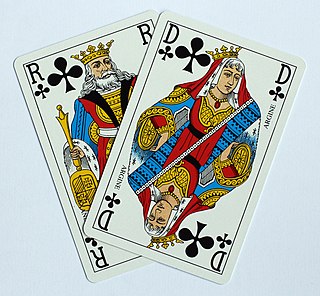
Belote is a 32-card, trick-taking, Ace-Ten game played primarily in France and certain European countries, namely Armenia, Bulgaria, Croatia, Cyprus, Georgia, Greece, Luxembourg, Moldova, North Macedonia, Bosnia and Herzegovina and also in Saudi Arabia. It is one of the most popular card games in those countries, and the national card game of France, both casually and in gambling. It appeared around 1900 in France, and is a close relative of both Klaberjass and Klaverjas. Closely related games are played throughout the world. Definitive rules of the game were first published in French in 1921.

Bid Euchre, Auction Euchre, Pepper, or Hasenpfeffer, is the name given to a group of card games played in North America based on the game Euchre. It introduces an element of bidding in which the trump suit is decided by which player can bid to take the most tricks. Variation comes from the number of cards dealt, the absence of any undealt cards, the bidding and scoring process, and the addition of a no trump declaration. It is typically a partnership game for four players, played with a 24, 32 or 36-card pack, or two decks of 24 cards each.
These terms are used in contract bridge, using duplicate or rubber scoring. Some of them are also used in whist, bid whist, the obsolete game auction bridge, and other trick-taking games. This glossary supplements the Glossary of card game terms.
Two-ten-jack is a Japanese trick-taking card game for two players that takes its name from the three highest-scoring cards in the game: the 2, 10 and Jack in three different suits.

Konter a Matt, Kontra a Matt or Konter a Midd is a Luxembourgish trick-taking card game played by four players. The game is popular enough to have been televised on RTL, Luxembourg's leading TV station and for tournaments to be organised. Konter a Matt is one of a family of similar games, known as the Couillon Group, played in the Benelux area. Other games in the family include the Belgian game of Couillon, known as Kwajongen in Flemish areas and Kujong in Luxembourg, the Dutch game of Troeven and the Belgian games of Brûte and Gamelle.

Botifarra is a point trick-taking card game for four players in fixed partnerships played in Catalonia, in the northeast of Spain, and parts of Aragon, the Balearic Islands and North of the Valencian Country. It is a historical game also played in many parts of Spain, not only in bars and coffee shops. The game is closely related to Manille from which it takes the mechanics, but its rules induce deduction and minimise the effects of luck.
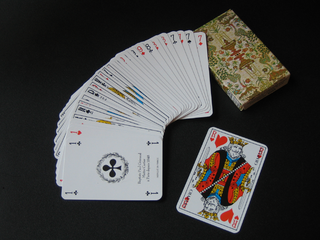
Manille is a Catalan French trick-taking card game which uses a 32 card deck. It spread to the rest of France in the early 20th century, but was subsequently checked and reversed by the expansion of Belote. It is still popular in France and the western part of Belgium.
Turkish King is a Turkish compendium game for four players comprising 20 rounds. It is a variety of the game King, which is popular in France, Belgium, Italy, Portugal, Russia, Colombia, and Brazil.
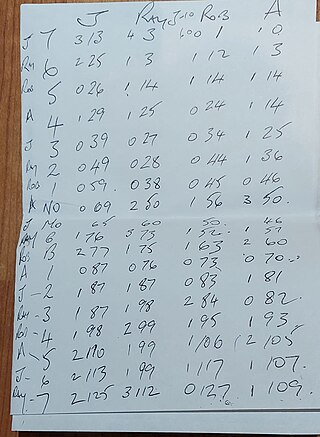
Clag is a trick-taking card game using a standard pack of 52 French-suited playing cards. It is similar to Oh Hell, and can be played by three to seven players. Clag originated in the Royal Air Force and started as an acronym for Clouds Low Aircraft Grounded.

Bauerntarock also called Brixentaler Bauerntarock or Brixental Tarock, is a point-trick card game played in the Brixental, Austria. It may have originated in the 19th century either as an adaptation of 54-card Tapp Tarock onto the cheaper and smaller 36-card German pack. Another possibility is that it was adapted from the 78-card Grosstarock or Taroc l'Hombre game as the ratio of trumps to non-trumps is almost the same. It uses the Skat Schedule found in popular regional games such as Jass and Schafkopf. It is closely related to Bavarian Tarock, German Tarok, Württemberg Tarock and especially Dobbm. Like Bavarian Tarock and Tapp, Brixental Bauerntarock and Dobbm do not belong to the true tarot games, but have adopted rules from Tapp Tarock. The most fundamental difference between these games and true tarot games is in the use of German or French decks instead of true Tarot playing cards.

Officers' Skat (Offiziersskat), is a trick-taking card game for two players which is based on the rules of Skat. It may be played with a German or French pack of 32 cards which, from the outset of the game, are laid out in rows both face down and face up. As in Skat, tricks are taken and card points counted to determine the winner of a round; game points are then awarded to decide the winner of a game. There are several local variations of the game, which differ mainly in the number of cards revealed or hidden and the calculation of points.
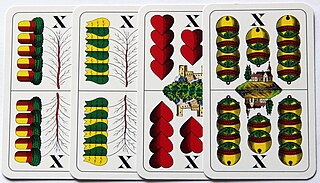
Matzlfangen is a traditional point-trick, card game for 4 players that originated in the Bavarian province of Upper Palatinate over 200 years ago and spread to Austria. It is still played in a few places today. The game is named after the Ten or Matzl, which plays a key role.
Zwanzig ab, 20 ab or simply Zwanzig is card game for four players. It is a member of the Rams family in which the key feature is that players may choose to drop out of the game if they believe their hand is not strong enough to take a minimum number of tricks. It appears to be a recent, internet-propagated variant of Schnalzen or Bohemian Watten. However, the latter has a natural card ranking, is played with double German cards and a Weli, has no exchanging and has a different scoring system. It is suitable for children from 8 upwards. It may be related from Fünf dazu! which is a simpler game described by Gööck in 1967 that has neither trumps nor the option to drop out.
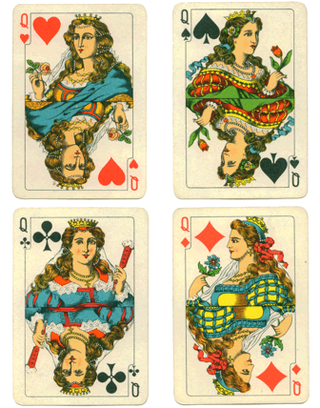
Baśka is a fast-moving, Polish card game for four players played using traditional French-suited playing cards. It uses a shortened pack of just 16 cards and is similar to Kop which is also played in Poland. Both are derived from German Schafkopf.

Sjavs is a Danish card game of the Schafkopf family that is played in two main variants. In Denmark, it is a 3-player game, played with a shortened pack of 20 cards; in the Faroe Islands, where it is very popular, it is a four-hand, partnership game using a standard Piquet pack of 32 cards.
















